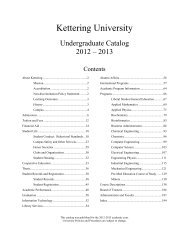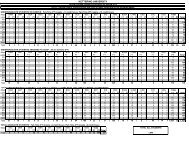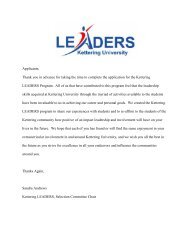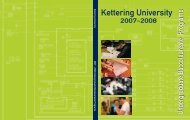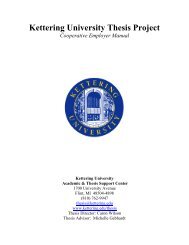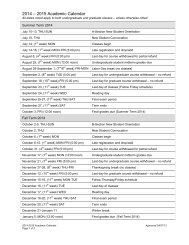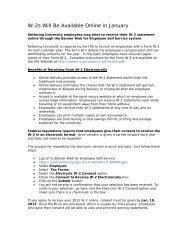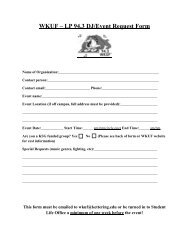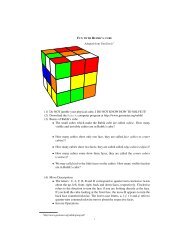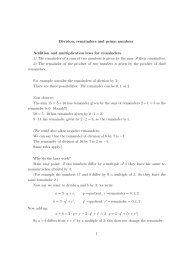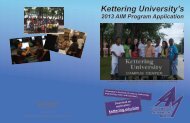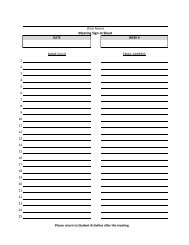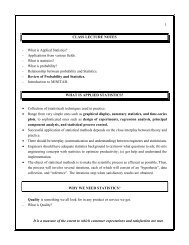2006-2007 Undergraduate Catalog - Kettering University
2006-2007 Undergraduate Catalog - Kettering University
2006-2007 Undergraduate Catalog - Kettering University
Create successful ePaper yourself
Turn your PDF publications into a flip-book with our unique Google optimized e-Paper software.
Copyright & Disclaimer Information: Copyright © 1994, 1995, 1996, 1997, 1998, 1999, 2000, 2001, 2002, 2003, 2004, 2005, <strong>2006</strong>, <strong>2007</strong>. CollegeSource®, Inc. and Career Guidance Foundation. CollegeSource® digital catalogs are derivative works owned and copyrighted by CollegeSource®, Inc. and Career Guidance Foundation. <strong>Catalog</strong> content is owned and copyrighted by the appropriate school. While CollegeSource®, Inc. and Career Guidance Foundation provides information as a service to the public, copyright is retained on all digital catalogs.<br />
Copyright & Disclaimer Information: Copyright © 1994, 1995, 1996, 1997, 1998, 1999, 2000, 2001, 2002, 2003, 2004, 2005, <strong>2006</strong>, <strong>2007</strong>. CollegeSource®, Inc. and Career Guidance Foundation. CollegeSource® digital catalogs are derivative works owned and copyrighted by CollegeSource®, Inc. and Career Guidance Foundation. <strong>Catalog</strong> content is owned and copyrighted by the appropriate school. While CollegeSource®, Inc. and Career Guidance Foundation provides information as a service to the public, copyright is retained on all digital catalogs.<br />
Course Descriptions / 135<br />
BUSN-572 Innovation and New Ventures 4 0 0 4<br />
This inter-disciplinary course focuses on the creation or startup of a new<br />
organization based on an innovation in product, process or delivery. Particular<br />
emphasis is placed on creating new products or services in response to a<br />
human need, testing at several stages of a new product development process,<br />
gaining initial customers, gaining distribution, obtaining financial support<br />
and managing the new organization. This is a “hands on” course where<br />
students will actually develop some new product idea and/or prototype,<br />
conduct various types of market research and write initial business plans.<br />
The course is flexible to support students interested in a variety of fields<br />
including fuel cell, international business and biomedical. Terms offered:<br />
Summer, Fall<br />
CE-210 Digital Systems I 3 0 2 4<br />
Prerequisite: CS-101<br />
Formal design techniques for combinational and sequential logic circuits are<br />
studied. Topics include number systems and codes, combinational logic<br />
networks, registers, synchronous sequential networks, control units,<br />
instruction-controlled systems, and stored program processors. Terms Offered:<br />
All<br />
CE-310 Digital Systems II 3 0 2 4<br />
Prerequisites: CE-210, EE-320, EE-321<br />
This advanced course in digital systems covers the principles and practices<br />
used in the design of modern complex combinational and sequential digital<br />
systems. Fundamental algorithms underlying computer-aided design are<br />
covered. Schematic diagrams and hardware description languages are used<br />
to specify designs targeted for implementation in technologies including<br />
discrete integrated circuits, application-specific integrated circuits, and both<br />
simple and complex programmable logic devices. Professional-quality<br />
computer-aided design tools and development hardware are used in the<br />
laboratory to synthesize, simulate, implement, and document designs. Terms<br />
Offered: Winter, Spring<br />
CE-316 Logic Systems for Manufacturing 3 0 2 4<br />
Prerequisites: CE-210, EE-210, EE-211<br />
Design techniques for circuits used to control repetitive manufacturing<br />
processes are studied. Topics include asynchronous sequential circuit design<br />
and analysis using electronics, relays, and programmable controllers; onehot<br />
code design; and safety considerations. Terms Offered: Summer, Fall<br />
CE-320 Microcomputers I 3 0 2 4<br />
Prerequisites: CS-101, CE-210<br />
Principles of microcomputer hardware and software are presented. Topics<br />
include instruction sets and addressing modes; structured assembly language<br />
programming; top/down design; introductory machine architecture and its<br />
relationship to programming; introduction to hardware found in typical<br />
microcontrollers; microcomputer interfacing using standard integrated<br />
circuits.<br />
Terms Offered: All<br />
CE-420 Microcomputers II 3 0 2 4<br />
Prerequisites: CE-320, EE-320, EE-321<br />
This advanced course in microcomputers systems covers the architecture<br />
and applications of advanced contemporary microcomputers through study<br />
of Motorola’s 16-bit MC68HC12 and 32-bit MC 68332. MC68HC12 topics<br />
include its instruction set, addressing modes, interrupts, timer module, ADC<br />
module, and background debug module, along with parallel and serial<br />
interfacing and software development and debugging techniques. MC 68332<br />
topics include overviews of its instruction set, addressing modes, and<br />
exception handling. The course has a laboratory component that focuses on<br />
peripheral interfacing and the design, development, debugging, and<br />
documentation of assembly-language programs using modern development<br />
tools. Terms Offered: Summer, Fall<br />
CE-422 Computer Architecture and Organization 3 0 2 4<br />
Prerequisite: CE-320<br />
The fundamental concepts in computer architecture and organization are<br />
presented. Laboratory assignments using VHDL simulation are a major<br />
portion of the course. Topics include arithmetic logic unit design; floating<br />
point unit; control unit design; microprogramming; memory organization;<br />
cache design; input/output processing; parallel processing; pipelining; RISC<br />
architecture; examples of commercial computer architectures. Terms Offered:<br />
Winter, Spring<br />
CE-426 Real-Time Embedded Computers 3 0 2 4<br />
Prerequisites: CS-202, CE-320<br />
Design and implementation of real-time computer systems are studied. Topics<br />
include the design and implementation of a basic real-time multiprogramming<br />
operating system (using the C programming language); typical applications<br />
of embedded computers; and real-time software and hardware interfacing.<br />
Several short design projects and one large design project are completed.<br />
Terms Offered: Summer, Fall<br />
CE-436 Data Acquisition and Databases 3 0 2 4<br />
Prerequisites: CS-102, CS-202, CE-320<br />
Design and implementation of stand-alone data acquisition systems using<br />
relational databases are studied. Topics include conceptual data models;<br />
database system architecture; normalization rules for relational design; data<br />
base integrity and security; and a query/update data language. A database<br />
project requiring direct hardware data acquisition is completed. Terms Offered:<br />
Winter, Spring<br />
CE-442 Introduction to Mobile Robotics 3 0 2 4<br />
Prerequisites: CE-320 and Senior Standing in either CE, CS, or EE<br />
This computer engineering course introduces senior-level engineering students<br />
to the fundamentals of robotics with an emphasis on mobile robots, which<br />
are integrated mechanical, electrical and computational systems functioning<br />
in the physical world. Topics include state-of-the-art technologies in mobile<br />
robotics such as locomotion, sensing, communication, localization and<br />
mapping, and navigation. Based on the interest of the class, advanced topics<br />
such as coordination of multiple mobile robots and Internet-based mobile<br />
robots may also be discussed. The course aims to provide both theoretical<br />
and practical experience through lectures, hands-on experiments and term<br />
projects with simulation software and real robots (LEGO Technic robots and<br />
Pioneer 2DXe mobile robot equipped with sonar, camera and wireless<br />
communication). Reading and presentation of research papers as well as<br />
writing of project reports is required.Terms Offered: Winter, Spring<br />
CE-480 Computer Networks 3 0 2 4<br />
Prerequisites: CE-320, MATH-408<br />
Organization, analysis, and design of interconnected systems of computers<br />
are studied. Topics include the Open System Interconnection model; the<br />
Internet model; network topology; media types; protocols; Ethernet; ATM;<br />
routing; TCP/IP; industrial networks; and Internet applications. Terms Offered:<br />
Summer, Fall<br />
CE-482 Distributed Embedded Systems 3 0 2 4<br />
Prerequisites: CE-320 and Senior Standing in either CE, CS, or EE<br />
This course addresses the most important topics in embedded systems<br />
operating in a network environment. Topics include: typical applications of<br />
distributed embedded systems, digital control systems, real-time scheduling<br />
and computing, real-time distributed systems, real-time networks and<br />
protocols, real-time embedded software, rapid prototyping, network-based<br />
software, and dependability concepts. A complete commercial hardware and<br />
software development environment that supports rapid prototyping, automated<br />
code generation, and debugging is used in laboratory assignments and a term<br />
project to develop a complete distributed embedded application. Automotive<br />
applications are emphasized. Terms Offered: Winter, Spring<br />
CE-490 Senior Computer Engineering Design Project 2 0 4 4<br />
Prerequisite: Senior Thesis Standing in Computer Engineering<br />
Students are prepared for engineering practice through a major design<br />
experience based on knowledge and skills acquired in earlier course work.<br />
They work in teams to design and develop a prototype embedded-computer<br />
or other complex digital system to meet a given specification. The specification<br />
requires the design to incorporate relevant engineering standards and to<br />
address most of the following: manufacturability, sustainability, and economic,<br />
environmental, ethical, health and safety, social, and political considerations.<br />
Designs are documented in a professional manner and presented publicly.<br />
Terms Offered: Winter, Spring



